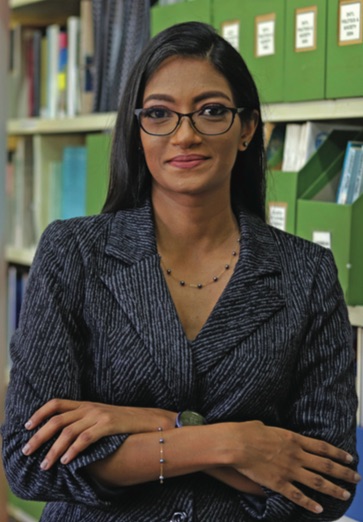
“One of the defining moments of my professional life was taking a career aptitude test at the Student Services department at The UWI,” says Dr Bephyer Parey.
“What the test told me was that I needed to be around people, and that I needed a job which would focus on others and on building community. I had never really thought much of it before, but taking that test really revealed to me that a career in mathematics and statistics was not going to be enough for me. Interacting with other people is what would bring me the most joy.”
This quest for building and strengthening communities has deeply shaped Dr Parey’s life’s work, and she is not only now recognised as one of The UWI's most prominent researchers, but also regarded as a superstar educator.
Initially trained in mathematics and statistics, and currently working as a Junior Research Fellow at the Sir Arthur Lewis Institute of Social and Economic Studies (SALISES), Dr Parey has been able to integrate this desire to build communities through her teaching practice. She is a passionate educator who goes above and beyond in the classroom. Just last year, she was awarded the prestigious UWI/Guardian Group Premium Teaching Award, which is given to educators who have demonstrated excellence in teaching.
She believes that one of the reasons for her success is her ability to form strong connections with her students:
“I try to build rapport with my students from day one, and also encourage them to build rapport amongst themselves. Many of them will end up working in fields, such as policy development, where they will be working in teams, so it is essential that they learn to dialogue with each other.”
Aside from striving to encourage a sense of comradeship in her classroom, Dr Parey also believes that it is essential to cultivate students’ emotional intelligence. She echoes the same sentiment as many educators who have been observing students since the beginning of the pandemic: many of them are struggling.
“Many of our students are going through a lot in their personal lives, but they do not have the tools to process these emotions properly, and this has an effect on their academic success. So, we try to give them the tools to develop awareness of their own emotions.”
Another important aspect of her pedagogical practice is the aim to expose her students to as many different ideas and scenarios as possible. “This came to me from one of my own professors at The UWI, Professor Edward Farrell (now retired), who once shared in a talk that it was not about 'being bright', but about 'being exposed’. This is something that has always stuck with me.”
Dr Parey is also the holder of a PhD in Social Policy, and her thesis focused on the barriers to the including persons with disabilities in this country. Most recently, she has been involved in a public awareness campaign in which she sought to spotlight the experiences and contributions of people living with disabilities in Trinidad and Tobago. Both her PhD and the project have sprung from personal experiences in her life.
“My own father became physically disabled when I was just 13 years old,” says Dr Parey. “Although at the time I couldn't truly understand everything that my father was going through, I know that this experience is one which has led me to the work that I do now advocating for persons with disabilities here in T&T.”
Apart from cultivating her passion for research, education, and advocacy, Dr Parey has always strove to seek balance in her personal life.
“Throughout my studies, especially during my undergrad, I was also very involved in extracurricular activities, and I saw the importance of balancing my academic and social needs. I didn't want to focus only on my degree while neglecting other aspects of my life, and I still don't. This is something I also try to encourage with my students. There are different aspects to our lives, and we should always try to involve ourselves in communities corresponding to these different aspects. Having balance in our lives is essential.”